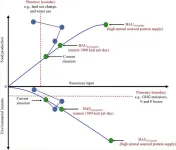(Press-News.org) Research Highlights:
Middle-aged Black women with better heart health were less likely to show a decline in mental function compared with middle-aged Black women with worse heart health.
In this study, heart health was unrelated to cognitive decline among middle-aged white women.
A clinical trial is required to confirm if improving heart health among middle-aged Black women may slow cognitive decline and decrease the risk of dementia.
Embargoed until 2 a.m. CT/3 a.m. ET Wednesday, April 24, 2024
DALLAS, April 24, 2024 — Better heart health was linked to less decline in mental processing speed and cognition among middle-aged Black women, although not among middle-aged white women, according to new research published today in the Journal of the American Heart Association, an open access, peer-reviewed journal of the American Heart Association.
“Take care of your heart, and it will benefit your brain,” said study lead author Imke Janssen, Ph.D., a professor of family and preventive medicine at Rush University Medical Center in Chicago. “Better cardiovascular health in women in their 40s is important to prevent later-life Alzheimer’s disease, dementia and to maintain independent living.”
Previous research has linked heart health to a lower risk of cognitive decline. This decline may begin years before the onset of dementia, Janssen explained. Questions that need to be answered include understanding when the cognitive benefits of heart health begin, whether they occur among people of different races and whether they affect different types of brain function including reasoning.
In this study, researchers compared key heart health metrics, known as the American Heart Associations’ Life’s Essential 8, among middle-aged Black and white women to cognitive testing conducted on the women every one to two years over a 20-year period.
Life’s Essential 8TM includes objectively measured weight, blood pressure, glucose, and cholesterol, as well as self-reported health behaviors such as eating healthy foods, being physically active, not smoking and getting enough sleep.
The cognitive tests assessed processing speed and working memory. Processing speed is the pace at which the brain has accurate recognition of visual and verbal information and is necessary for daily activities such as driving. In this study, cognitive processing speed was assessed as quickly and accurately recognizing sets of numbers, objects, pictures or patterns. Working memory is the ability to remember and use small pieces of information for daily tasks, including remembering names and doing math.
The study found differences in cognitive decline by race only in processing speed, not in working memory. Specifically:
Black women with lower heart health, based on the Life’s Essential 8 metrics, had a 10% decrease in processing speed over 20 years. Their scores were worse for all eight risk factors for heart disease, especially blood pressure and smoking.
In contrast, Black women with good heart health showed little decline in mental processing during the 20-year study.
Among white women with poorer heart health, processing speed did not decline.
Heart health did not affect working memory for Black or white women.
“We were surprised that we did not find results like those of past studies, which showed cognitive decline in Black and white men and women, and found cardiovascular health to be more important for white adults rather than people in Black subgroups,” Janssen said. “We think these differences are due to the younger age of our participants, who began cognitive testing in their mid-40s, whereas previous studies started with adults about 10 to 20 years older. The next step is a clinical trial to confirm whether optimizing heart health in Black women at midlife may slow cognitive aging, maximize independence and reduce racial inequities in dementia risk.”
Several limitations may have affected the study’s results. The study included women from a single study site and relied on self-reported measures of heart health, which may have been inaccurate. In addition, the study did not include measures that may account for racial differences in access to health care or the potential impact of structural racism on Black participants.
Study background and details:
The study included 363 Black and 402 white women from the Chicago site of the Study of Women’s Health Across the Nation (SWAN).
The Chicago SWAN group started cognitive testing in 1997, when the women were between 42 and 52 years old. Cognitive testing continued every one to two years through 2017.
The analytic sample consisted of 765 women who provided 5,079 cognitive processing speed and 4,933 working memory assessments over the 20-year period.
Heart health based on Life’s Essential 8 was assessed at time of enrollment only.
Co-authors, disclosures and funding sources are listed in the manuscript.
Studies published in the American Heart Association’s scientific journals are peer-reviewed. The statements and conclusions in each manuscript are solely those of the study authors and do not necessarily reflect the Association’s policy or position. The Association makes no representation or guarantee as to their accuracy or reliability. The Association receives funding primarily from individuals; foundations and corporations (including pharmaceutical, device manufacturers and other companies) also make donations and fund specific Association programs and events. The Association has strict policies to prevent these relationships from influencing the science content. Revenues from pharmaceutical and biotech companies, device manufacturers and health insurance providers and the Association’s overall financial information are available here.
Additional Resources:
Multimedia is available on the right column of release link https://newsroom.heart.org/news/good-heart-health-in-middle-age-may-preserve-brain-function-among-black-women-as-they-age?preview=893303839ed75f947823661a0ba093be
After April 24, 2024, view the manuscript online.
AHA health information: The link between heart health and brain health
AHA news release: Coronary heart disease before age 45 may increase risk of dementia later in life (Nov. 2023)
AHA news release: Lowering blood pressure significantly reduced dementia risk in people with hypertension (Nov. 2023)
AHA news release: Healthy lifestyle behaviors reduced dementia risk despite family history of dementia (May 2021)
Follow AHA/ASA news on X (formerly known as Twitter) @HeartNews
Follow news from the Journal of the American Heart Association @JAHA_AHA
###
About the American Heart Association
The American Heart Association is a relentless force for a world of longer, healthier lives. We are dedicated to ensuring equitable health in all communities. Through collaboration with numerous organizations, and powered by millions of volunteers, we fund innovative research, advocate for the public’s health and share lifesaving resources. The Dallas-based organization has been a leading source of health information for a century. During 2024 - our Centennial year - we celebrate our rich 100-year history and accomplishments. As we forge ahead into our second century of bold discovery and impact, our vision is to advance health and hope for everyone, everywhere. Connect with us on heart.org, Facebook, X or by calling 1-800-AHA-USA1.
For Media Inquiries and AHA/ASA Expert Perspective: 214-706-1173
Bridgette McNeill: Bridgette.mcneill@heart.org
For Public Inquiries: 1-800-AHA-USA1 (242-8721)
heart.org and stroke.org
END
Good heart health in middle age may preserve brain function among Black women as they age
Cognitive decline among Black women linked to poor heart health in middle age, finds new study in Journal of the American Heart Association
2024-04-24
ELSE PRESS RELEASES FROM THIS DATE:
The negative effects of racism impact sleep in adolescents
2024-04-24
Sleep and sleep disturbances have consequences for the development of adolescents and young adults. In a new article, researchers examine sleep during these periods, focusing on the effects of ethnic and racial discrimination. They conclude that improving sleep may boost health for all youth, but especially for those affected by racism.
The article, by researchers at Fordham University and the University of Illinois at Urbana-Champaign, appears in Child Development Perspectives, a journal of the Society for Research in Child Development.
“Discrimination ...
Study uses wearable devices to examine 3- to 6-year-olds’ impulsivity, inattentiveness
2024-04-24
Why do some young children struggle to sit through a story one day but not the next? Why do they rush impulsively into one activity but not another? Parents and teachers often focus on individual differences as they prepare children for formal schooling, but traditional measurement approaches make it difficult to study fluctuations in children’s behavior.
In a new study, researchers sought to understand children’s impulsive and inattentive behaviors in early education classrooms by having students use wearable devices called accelerometers to collect an intensive time series of their movement at school. The study found that children modulated their ...
Will future hurricanes compromise New England forests’ ability to store and sequester carbon?
2024-04-24
Nature-based climate solutions can help mitigate climate change, especially in forested regions capable of storing and sequestering vast amounts of carbon. New research published in Global Change Biology indicates that a single hurricane in New England, one of the most heavily forested regions in the United States, can down 4.6–9.4% of the total aboveground forest carbon, an amount much greater than the carbon sequestered annually by New England’s forests.
The work revealed that emissions from hurricanes are not instantaneous—it takes approximately 19 years for downed carbon to become a net emission, and 100 years for 90% of the downed carbon ...
Longest study to date assesses cognitive impairment over time in adults with essential tremor
2024-04-24
Essential tremor, a nervous system disorder that causes rhythmic shaking, is one of the most common movement disorders. A new study published in the Annals of Neurology reveals details on the increased risk of mild cognitive impairment (MCI) and dementia that individuals with essential tremor may face.
The research represents the longest available longitudinal prospective study of rates of MCI and dementia in people with essential tremor. The study enrolled 222 patients, 177 of whom participated in periodic evaluations over an average follow-up of 5 years.
Investigators observed ...
Does a woman’s heart health affect cognition in midlife?
2024-04-24
A new study has found that Black women with poor cardiovascular health may face an elevated risk of early signs of cognitive decline in midlife.
The study, which is published in the Journal of the American Heart Association, included 363 Black and 402 white women who enrolled in the Chicago site of the Study of Women’s Health Across the Nation when they were 42–52 years old. Cognition (measured as processing speed and working memory) was assessed annually or biennially over a maximum of 20 years, with an average follow-up of 9.8 years. A composite index of cardiovascular health (Life’s Essential 8) was calculated ...
Unveiling the mysteries of cell division in embryos with timelapse photography
2024-04-24
The beginning of life is shrouded in mystery. While the intricate dynamics of mitosis is well-studied in the so-called somatic cells – the cells that have a specialized function, like skin and muscle cells – they remain elusive in the first cells of our bodies, the embryonic cells. Embryonic mitosis is notoriously difficult to study in vertebrates, as live functional analyses and -imaging of experimental embryos are technically limited, which makes it hard to track cells during embryogenesis.
However, researchers from the Cell Division Dynamics Unit at the Okinawa Institute of Science and Technology ...
Survey finds loneliness epidemic runs deep among parents
2024-04-24
COLUMBUS, OHIO – A new national survey conducted by The Ohio State University Wexner Medical Center finds a broad majority of parents experience isolation, loneliness and burnout from the demands of parenthood, with many feeling a lack of support in fulfilling that role.
The survey of parents conducted this month found:
About two-thirds (66%) felt the demands of parenthood sometimes or frequently feel isolating and lonely.
About 62% feel burned out by their responsibilities ...
Researchers develop high-energy-density aqueous battery based on halogen multi-electron transfer
2024-04-24
Traditional non-aqueous lithium-ion batteries have a high energy density, but their safety is compromised due to the flammable organic electrolytes they utilize.
Aqueous batteries use water as the solvent for electrolytes, significantly enhancing the safety of the batteries. However, due to the limited solubility of the electrolyte and low battery voltage, aqueous batteries typically have a lower energy density. This means that the amount of electricity stored per unit volume of aqueous battery is relatively low.
In a new study published in Nature Energy, a research group led by Prof. LI Xianfeng from the Dalian Institute of Chemical Physics (DICP) ...
Towards sustainable food systems: global initiatives and innovations
2024-04-24
Contemporary food systems were originally developed to tackle challenges of the mid-20th century, aiming to supply abundant, efficient, non-perishable starchy calories to accommodate the expanding global population. Although substantial progress has been made in global food security over the past several decades, there still exist large populations experiencing hunger worldwide. Currently, global hunger primarily refers to insufficient calorie intake. Hidden hunger is the presence of multiple micronutrient in the absence of an energy-deficit diet. Hidden hunger, particularly the inadequate consumption of high-quality protein, ...
Coral identified as oldest bioluminescent organism, suggesting a new model of ancient ecology
2024-04-24
An international team of researchers, led by Danielle DeLeo from the Smithsonian Institution, has identified eight organisms with previously unknown luminosity. Using genetic findings from these organisms and previous studies, they estimated that coral bioluminescence originated about 540 million years ago in the Cambrian period, making them the earliest bioluminescent organisms. During this period, they shared the oceans with invertebrates with light-sensitive eyes, hinting that interspecies interactions occurred involving light. They published their findings in Proceedings of the Royal Society B.
While shallow-water ...
LAST 30 PRESS RELEASES:
Pollen exposure linked to poorer exam results taken at the end of secondary school
7 hours 18 mins may be optimal sleep length for avoiding type 2 diabetes precursor
Around 6 deaths a year linked to clubbing in the UK
Children’s development set back years by Covid lockdowns, study reveals
Four decades of data give unique insight into the Sun’s inner life
Urban trees can absorb more CO₂ than cars emit during summer
Fund for Science and Technology awards $15 million to Scripps Oceanography
New NIH grant advances Lupus protein research
New farm-scale biochar system could cut agricultural emissions by 75 percent while removing carbon from the atmosphere
From herbal waste to high performance clean water material: Turning traditional medicine residues into powerful biochar
New sulfur-iron biochar shows powerful ability to lock up arsenic and cadmium in contaminated soils
AI-driven chart review accurately identifies potential rare disease trial participants in new study
Paleontologist Stephen Chester and colleagues reveal new clues about early primate evolution
UF research finds a gentler way to treat aggressive gum disease
Strong alcohol policy could reduce cancer in Canada
Air pollution from wildfires linked to higher rate of stroke
Tiny flows, big insights: microfluidics system boosts super-resolution microscopy
Pennington Biomedical researcher publishes editorial in leading American Heart Association journal
New tool reveals the secrets of HIV-infected cells
HMH scientists calculate breathing-brain wave rhythms in deepest sleep
Electron microscopy shows ‘mouse bite’ defects in semiconductors
Ochsner Children's CEO joins Make-A-Wish Board
Research spotlight: Exploring the neural basis of visual imagination
Wildlife imaging shows that AI models aren’t as smart as we think
Prolonged drought linked to instability in key nitrogen-cycling microbes in Connecticut salt marsh
Self-cleaning fuel cells? Researchers reveal steam-powered fix for ‘sulfur poisoning’
Bacteria found in mouth and gut may help protect against severe peanut allergic reactions
Ultra-processed foods in preschool years associated with behavioural difficulties in childhood
A fanged frog long thought to be one species is revealing itself to be several
Weill Cornell Medicine selected for Prostate Cancer Foundation Challenge Award
[Press-News.org] Good heart health in middle age may preserve brain function among Black women as they ageCognitive decline among Black women linked to poor heart health in middle age, finds new study in Journal of the American Heart Association



